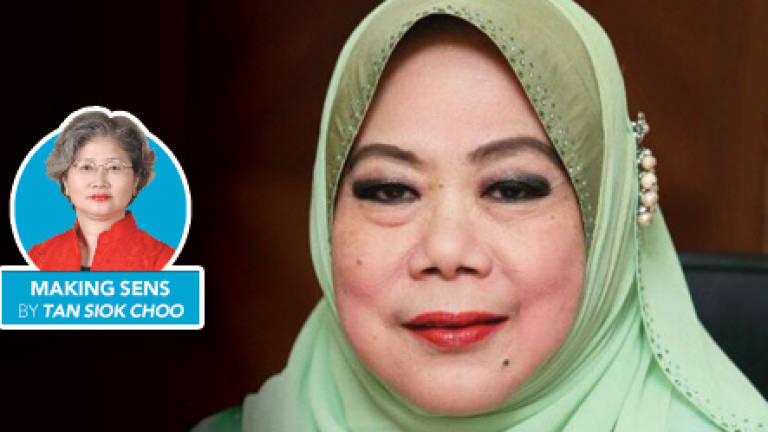Column - What makes an auditor-general?

ON Feb 23, Tan Sri Dr Madinah Mohamad was appointed as auditor-general for a two-year term, an appointment that triggered a debate on two issues.
First, is an accounting qualification an essential criterion for an auditor-general? Second, should the political views of the spouse be a factor in determining the candidate's suitability or otherwise to assume this position?
Separately, Madinah's appointment is noteworthy because she is the first woman to be appointed auditor-general. It is hoped she was chosen because she was the best candidate – and not because she was a woman.
Selecting an auditor-general based on gender rather than on merit is an insult to women in general and to Madinah in particular.
Madinah is the complete academic – possessing a Bachelor's degree in Political Science from Universiti Sains Malaysia, a Masters in Science in Human Resource Development and a Doctorate in Human Resource Management from Universiti Putra Malaysia.
Madinah was secretary-general of two ministries – the Ministry of Science, Technology and Innovation and the Education Ministry – before her mandatory retirement last September.
Despite Madinah's strong academic credentials and lengthy work experience, the key issue is whether an auditor-general should be familiar with accounting.
Proponents would argue the auditor-general presides over a department staffed with auditors. Those unfamiliar with accounting may find it difficult to supervise their staff adequately.
Others disagree, highlighting the fact that one highly successful auditor-general wasn't a qualified accountant: the late Tan Sri Ahmad Noordin. Indeed, all auditors-general from Ahmad Noordin to Madinah's predecessor, Tan Sri Ambrin Buang, didn't possess this qualification.
When Ahmad Noordin was appointed auditor-general in May 1976, he persuaded Parliament to amend the Audit Act 1957. This change gave Ahmad Noordin access to all government files – in addition to the accounts – and enabled him to determine whether public funds were managed efficiently and in line with stated objectives instead of checking whether the spending was backed by adequate documents.
In contrast with previous audit reports that were highly technical and published three or four years later, Ahmad Noordin's audit reports were eminently readable and timely.
At times, the audit report also revealed government purchases at over-inflated prices. One notable example was the Armed Forces in Sabah and Sarawak paid RM4.90 and RM3.90 respectively for instant noodles that were sold in Peninsular Malaysia for 12 sen.
Ahmad Noordin also chaired a three-man panel tasked with determining how, why and what caused the RM2 billion Bumiputra Malaysia Finance (BMF) scandal. The panel's 33-page report was made public by the Mahathir administration in November 1984.
For his innovations as auditor-general as well as his diligence in determining individual and systemic failures in the BMF fiasco, Ahmad Noordin was granted the Magsaysay award in August 1985 – the first time this honour had been given to an auditor-general.
In its citation, the Magsaysay committee said Ahmad Noordin's appointment as auditor-general was notable for two reasons – he lacked a university degree and he was the first to be appointed to this position even though he wasn't an auditor.
One factor led Ahmad Noordin to become an award-winning auditor-general, a biography published by the Magsaysay Award Foundation revealed.
Aware that he lacked the requisite accounting skills when he was appointed Pahang's state financial officer in 1961, Ahmad Noordin enrolled in a two-year correspondence course at the Australian
Chartered Institute of Secretaries. He successfully passed this course that required him to master subjects like the principles of accounting, book-keeping, company law and English law.
Ahmad Noordin's career suggests the lack of an accounting qualification shouldn't disqualify a person from being appointed auditor-general. The question that needs to be asked is this: will an appointee who is a non-accountant follow Ahmad Noordin's example and take the initiative to remedy this deficiency?
In accepting the Magsaysay Award, Ahmad Noordin summed up succinctly the role of the auditor-general.
"We should try to make people aware of the need to be careful with public money. It is everybody's money. It should be spent for a purpose which serves the greatest good for the great number. The people have a right to know how their money is spent," he said.
Separately, should those tasked with selecting an auditor-general consider the political affiliations of the potential appointee's spouse?
Arguably, an auditor-general's greatest asset is his credibility. Not only should an appointee be impartial, he must be seen as impartial.
Opinions expressed in this article are the personal views of the writer and should not be attributed to any organisation she is connected with. She can be contacted at siokchoo@thesundaily.com